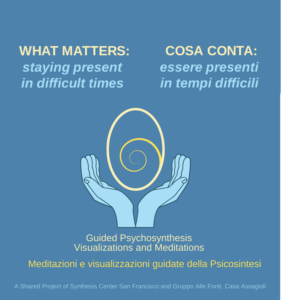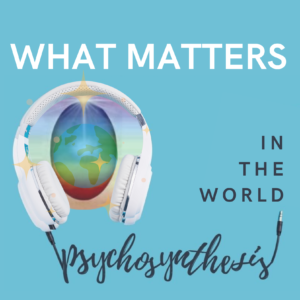More About Our Training
Psychosynthesis Coaching: The Psychology of What Matters
“The ‘call of self’, a phrase coined in psychosynthesis long ago, is the center point of the work. It is the assumption that each individual has the capacity to tune in deeply, to a sense of life purpose. Individuals enter coaching in response to this very call of self, as they have a need to grow, reorient, expand, heal or even reinvent their lives.”
~ Dr Dorothy (Didi) Firman, Distinguished Faculty, Psychosynthesis Life Coach Training
About Our Coach Training Program
Deepening Awareness, Developing Skill, Creating Your Voice as a Psychosynthesis Life Coach
Guide the journey along the act of will
- Know how to provide confidential, safe and supportive space for your client to connect to their inner resources and to realize purpose filled goals as they are guided through the stages of the act of will: purpose, deliberation, choice, affirmation, planning and goal manifestation.
Facilitate connection to transpersonal consciousness.
- Attend to your client by holding presence, through acknowledging skills and facilitative questions, that will enhance your client’s experience of being ‘seen’ in both their personal, day-by-day experience and in their capacity to transcend personal identifications towards a greater connection to transpersonal consciousness.
Support the alignment of purpose, meaning and values.
- Deepen and expand your capacity to coach clients in their creation of more purposeful, aligned lives. through the synthesis of foundational, core psychosynthesis theory and tools, with best practices in the field of life coaching.
Open doors for purpose filled expression
- Support your clients’ discovery, skill and self determination to bring transpersonal qualities of being, such as love, joy, creativity, kindness, beauty, compassion, contribution, into actionable forms in the creation of a life well lived and purposefully expressed.
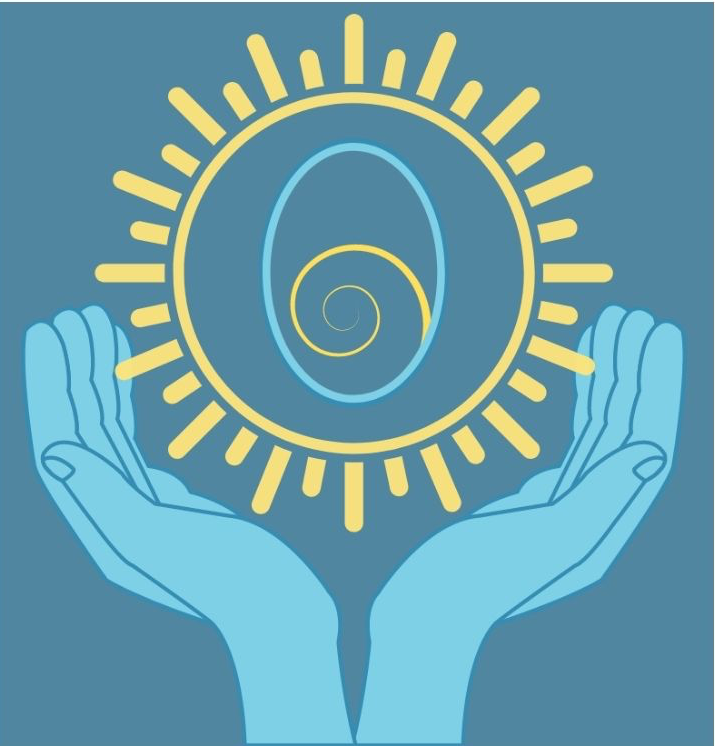
Your experiential learning takes place in a hybrid distance learning format, designed in 3-parts to support your experiential learning and engagement in training through live webinars and online resources and activities. In our 120-hour distance learning program you will participate within a cohort and attend the full program to receive the training hours to become a Psychosynthesis Life Coach (PLC). These hours can be used in fulfillment of the maximum training hours required to apply with the Center for Credentialing and Education (CCE) to become a Board Certified Coach (BCC)
The Synthesis Center (TSC) and Synthesis Center San Francisco (SCSF) has been qualified by the Center for Credentialing and Education, Inc. (CCE) as a Registered Credential Training Provider, RCTP1010-BCC, to provide training courses qualified for credit for eligibility for the CCE BCC CREDENTIAL. Courses that qualify for CCE credit are clearly identified. The Synthesis Center and Synthesis Center San Francisco is solely responsible for all aspects of the training courses.
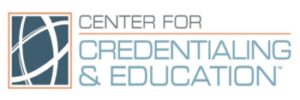

Years Offering Psychosynthesis Training and Programs
Countries represented by our Global Student Community
Cohort Size for Psychosynthesis Life Coach Training Program
Languages Spoken by our Students and Coaches
More about the training experience
Psychosynthesis Coaching:
The Psychology of What Matters – Coach Training Program
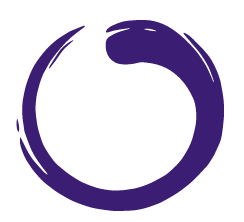
Program Delivery Formats
Our distance learning program is offered in a hybrid format with an average of 2-live webinars, of 2 – 3 hours, per month, with a total of 24 – 25 live webinars over the course of the program.
Online, on-demand learning content is available on our Teachable course page with resources uploaded following each live webinar.
The online content includes, audio of live webinars, additional video and audio, readings, experiential activities, a monthly journal prompt, and discussion and is a fundamental component of the program and engagement is required for course completion. The online component is designed to extend and ground the work in each live webinar unit.
Students are expected to spend 1- 2 hours per week with online content and discussion.
Live webinars are hosted by Zoom. Our online course component is hosted by Teachable.
Information and tips for using Zoom and Teachable are available on Teachable in the Introductory Unit upon enrollment before the first live webinar.
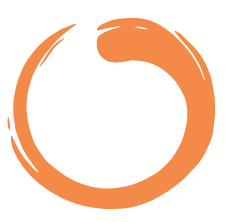
Program Participation/Completion Requirements
For program completion certification as a Psychosynthesis Life Coach (PLC) and in fulfillment of the hours required to apply for the BCC exam and credentialling process, we expect that you will attend a minimum of 80% of the live webinars and be an active participant during the webinars and online, on Teachable in the activities and discussion. And, completion of the following:
- Final Written Assignment: A comprehensive course assessment that includes a personal reflection/review of course curriculum and a self-assessment on the stages of the act of will; a coaching case study, description and analysis of an ethical dilemma utilizing the CCE-BCC code of ethicsm and a professional development plan utilizing the act of will as a framework.
- Coaching Audio: Students submit a 20 minute life coaching audio. They include a signed client release, brief follow up notes and a brief self-assessment.
- Act of Will Presentation: Students prepare a 10 minute presentation describing their personal /professional experience of psychosynthesis and their path along the act of will. This is an invitation to share the story, experience, learning, and process on their psychosynthesis life coach training journey, in their own unique way.
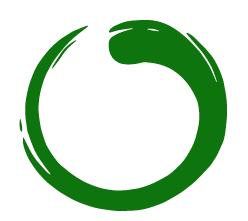
Inclusivity
Roberto Assagioli developed psychosynthesis as a “a dynamic and synthetic conception of the human being,” describing self-realization on the personal level as a stage towards inter-individual “right relations” and ultimately unification of all humanity.
As psychosynthesis coaches our work with clients includes guiding our clients journey of self-realization as both we, and our clients, continue to move towards, what Assagioli described, in stages, as “the psychosynthesis of humanity.”
We value and appreciate differences among people including those of race, gender, sexual orientation, ethnicity, national origin, functional ability, socio-economic status, age, religious or spiritual identification, and other aspects that comprise identity.
We believe that valuing cultural diversity facilitates human growth and development as well as enhances the quality of life for us all.
We are committed to expanding and enhancing our own awareness and understanding of cultural diversity and to find ways to infuse these into our programs and to being and actively becoming an antiracist organization in service of universal psychosynthesis.
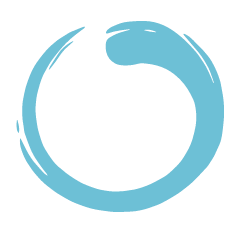
Statement on “doctrinal neutrality”
Roberto Assagioli intended psychosynthesis would be independent of any religious dogma or identification.
He wrote about psychosynthesis being both scientific and spiritual:
“psychosynthesis takes people to the door of the mystery, but the responsibility of taking the next step is their choice:
I wish to clarify that psychosynthesis, as a scientific conception and as bio-psychotherapeutic activity, does not take any specific position, neither metaphysical nor religious; it bestows the greatest value to these activities of the human spirit, but in no way does it try to invade their field; it arrives at the threshold of the mystery, and there it stops.
(“Psychosomatic Medicine & Bio-psychosynthesis” Rome1967)
We do not promote any specific religious nor spiritual doctrine.
Participants from all spiritual/religious belief systems are welcome.
Each of us is free to define transpersonal experience, understanding and practice in our own way.
Consistent with this, we believe that every person should be treated with dignity and respect.
In our guidelines we invite everyone to showing up to live webinars and online sharing and discussion with good and skillful will, treating others with kindness and acceptance, respecting the privacy of personal or professional information shared in the context of the cohort training, coming in aligned with your purpose and ready to commit your time, energy and presence to this work.
We are committed to the respect for the autonomy and self-determination of our team, students and clients – the only exception being when in our teams’ judgement, a students’ actions or potential actions pose a serious, foreseeable, and imminent risk to themselves or others.

Mental Health and Well Being
tudents engage in our live webinar groups and breakout discussions, online discussion, and in individual 3-hours of coaching around the act of will, as well as co-guiding with participants, we understand that this personal and professional growth education may uncover or touch emotional / psychological wounds which will require the support of a licensed therapist, counsellor, health care professional and/or group (or peer) support.
While we are not able to offer coaching/therapy/counseling engagement with students, due to the ethical dilemmas of dual/multiple relationships, please touch in with any member of our team if you require suggestions on resources/support. If you are feeling overwhelmed, stressed, or isolated, there are many individuals and organizations available to help, on the spot by text or phone.
Please note – most of these are US resources – International Crisis Service links will provide additional in-country services:
- Crisis Text Line: text HOME to 741741
- National Suicide Prevention Lifeline: 1-800-273-8255
- Crisis Text Line for Young People of Color: text STEVE to 741741
- TrevorLifeline (LGBTQ+):1-866-488-7386
- Disaster Distress Helpline (1-800-985-5990, or text TalkWithUs to 66746)
• •
International:
• International Crisis Services – including suicide hotlines: https://blog.opencounseling.com/suicide-hotlines/
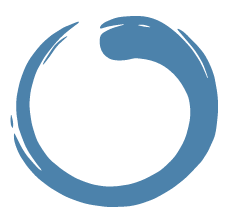
Program Texts
Required
- Act of Will by Roberto Assagioli
- Psychosynthesis by Roberto Assagioli
- Call of Self, Psychosynthesis Life Coaching, edited by Dorothy Firman, Ed.D. with a Forward by Patrick Williams Ed.D. Additional required and optional program reading will be included in monthly Unit resources on Teachable, including a complied resource guide at the end of each Program Part. Recommended – this is a short collection of recommended readings – we are growing a bibliography with each cohort which will be made available to students in our program as it continues to be developed.
- Becoming a Professional Life Coach, 2nd Edition by Patrick Williams
- The Dance of We: The Mindful Use of Love and Power in Human Systems by Mark Horowitz
- What We May Be by Piero Ferrucci … (we also recommend all Piero Ferrucci’s books on psychosynthesis themes)
- Coaching for Performance, 5th Edition by Sir John Whitmore
- Psychosynthesis: Psychology with a Soul, By Diana Whitmore … (we also recommend Diana Whitmore’s other books on psychosynthesis themes)
- Consciousness-in-Action: Toward an Integral Psychology of Liberation & Transformation by Raúl Quiñones-Rosado, PhD
- Primal Wound: A Transpersonal View of Trauma, Addiction and Growth by John Firman and Ann Gila … (we also recommend Firmin and Gila’s other books on psychosynthesis themes)
- Growing Whole by Molly Young Brown (and Molly Young Brown’s other books on psychosynthesis themes)
How to Apply
We invite anyone who experiences the call to this work to apply to our program.
The application process includes a personal statement, resume or CV or education/work-history, an interview with training faculty.
For more information about the training program and application guide – email us at:
info@PsychosynthesisCoachTraining.com
We have a rolling admissions process and continue to accept applications until the cohort is filled.
Our next training cohort begins September 2025….details and program guides coming soon!
Continuing Education, Advance Training, Coach Supervision, Social Transformation and Innovation
join our mailing list:
Info@SynthesisCenterSF.com to learn more about psychosynthesis coaching, continuing education, webinars and other initiatives,
Ready to Learn More?
Our next cohort will begin training in 2025.
Contact us to learn more and receive your program guide: Info@PsychosynthesisCoachTraining.com
